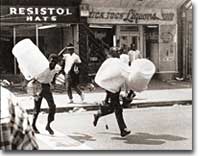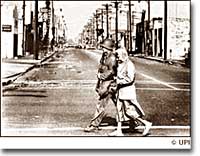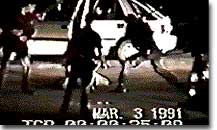54g. The Long, Hot Summers

Nearly 4000 people were arrested for various crimes, including looting, during the Watts riots of the 1960s.
On August 11, 1965, the atmosphere in the Watts district of Los Angeles turned white hot. A police patrol stopped Marquette Frye, suspecting he was driving while intoxicated. A crowd assembled as Frye was asked to step out of his vehicle. When the arresting officer drew his gun, the crowd erupted in a spontaneous burst of anger.
Too many times had the local citizens of Watts felt that the police department treated them with excessive force. They were tired of being turned down for jobs in Watts by white employers who lived in wealthier neighborhoods. They were troubled by the overcrowded living conditions in rundown apartments. The Frye incident was the match that lit their fire. His arrest prompted five days of rioting, looting, and burning. The governor of California ordered the National Guard to maintain order. When the smoke cleared, 34 people were killed and property damage estimates approached $40 million.

The National Guard was dispatched to Los Angeles to help quell the rioting plaguing the Watts section of the city. Here, a Guardsman helps a woman safely cross the street.
The urban uprising, part of what was often called "the long, hot summer," had actually begun in 1964. When a white policeman in Harlem shot a black youth in July 1964, a similar disturbance flared (though on a lesser scale than the Watt's riots.) Rochester, Jersey City, and Philadelphia exploded as well. From 1964 to 1966, outbreaks of violence rippled across many other northern urban areas, including Detroit, where 43 people were killed.
As youths of the counterculture celebrated the famed Summer of Love in 1967, serious racial upheaval took place in more than 150 American cities. The assassination of Martin Luther King Jr. in 1968 touched off a wave of violence in 125 more urban centers.

A quarter century after the Watts riots, a bystander took a video of white Los Angeles police officers beating Rodney King, a black suspect. The event triggered a riot in L.A. that lasted six days.
At the behest of President Johnson, the Kerner Commission was created to examine the causes behind the rioting. After a six-month study, the committee declared that the source of unrest was white racism. Despite legislative gains against discriminatory policies, America was moving toward two distinct societies divided along racial lines.
As the great migration of blacks from the South to northern cities continued, white northerners began deserting the cities for the suburbs.
African Americans had been victimized by poor education, the unavailability of quality employment, slum conditions, and police brutality. The average income of a black household was only slightly more than half the income of its white counterpart. The Kerner Commission recommended a wide array of social spending programs, including housing programs, job training, and welfare. Civil rights legislation became the cornerstone of Lyndon Johnson's Great Society program.






